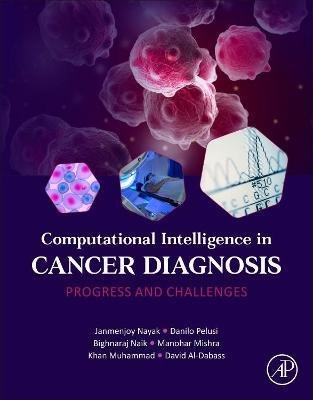Janmenjoy Nayak is an Assistant Professor, P.G. Department of Computer Science, Maharaja Sriram Chandra Bhanja Deo University, Baripada, Odisha, India. He has been a Gold Medallist in Computer Science twice in his career, and has been awarded the Innovation in Science Pursuit for Inspired Research (INSPIRE) Research Fellowship from the Department of Science & Technology, Government of India (at both Junior Research Fellow and Senior Research Fellow level) and Best Researcher Award from Jawaharlal Nehru University of Technology, Kakinada, Andhra Pradesh for the academic year 2018-19. He has received many other awards from national and international academic agencies. Dr. Nayak has edited 19 books and 8 special issues on the applications of computational intelligence, soft computing, and pattern recognition, which have been published by Springer and Inderscience. He has published more than 190 refereed articles in various book chapters, conferences, and peer-reviewed journals of Elsevier, Inderscience, Springer, the Institute of Electrical and Electronics Engineers (IEEE), and others. He has also served as a reviewer for more than 100 journals and conferences produced by the IEEE, the Association for Computing Machinery (ACM), Springer, Elsevier, Wiley, and Inderscience. He has 11 years of experience in both teaching and research. Dr. Nayak is a senior member of the IEEE and a life member of societies such as the Soft Computing Research Society (SCRS), the Computer Society of India (CSI India), the Orissa Information Technology Society (OITS), the Orissa Mathematical Society (OMS), and the International Association of Engineers (IAENG), Hong Kong. He has successfully conducted and is associated with 14 internationally renowned series conferences such as ICCIDM, HIS, ARIAM, CIPR, and SCDA. His areas of interest include data mining, nature-inspired algorithms, and soft computing. Danilo Pelusi is an Associate Professor in the Department of Communication Sciences, University of Teramo, where he received his PhD in Computational Astrophysics. He is an Editor of books for Springer and Elsevier, and an Associate Editor of IEEE Transactions on Emerging Topics in Computational Intelligence, and IEEE Access, and was an Associate Editor of International Journal of Machine Learning and Cybernetics. He is a Guest Editor for Elsevier, Springer, and Inderscience journals and keynote speaker in several IEEE conferences; he is also an editorial board member of many journals. His research interests include fuzzy logic, neural networks, information theory, machine learning, and evolutionary algorithms. Bighnaraj Naik is an Assistant Professor in the Department of Computer Application, Veer Surendra Sai University of Technology (formerly UCE Burla), Odisha, India. He has published more than 100 research articles in various peer reviewed international journals, conferences, and book chapters. He has edited 10 books for publishers including Elsevier, Springer, and IGI Global. At present, he has more than 10 years of teaching experience in the field of computer science and information technology. He is a member of the Institute of Electrical and Electronics Engineers (IEEE) and his areas of interest include data science, data mining, machine learning, deep learning, computational intelligence (CI), and CI´s applications in science and engineering. He has served as Guest Editor of various special issues of journals such as Information Fusion (Elsevier), Neural Computing and Applications (Springer), Evolutionary Intelligence (Springer), International Journal of Computational Intelligence Studies (Inderscience), and International Journal of Swarm Intelligence (Inderscience). He is an active reviewer of various journals from publishers including IEEE Transactions, Elsevier, Springer, and Inderscience. Currently, he is undertaking a major research project as Principal Investigator, which is funded by the Science and Engineering Research Board (SERB), Department of Science and Technology (DST), Government of India. Manohar Mishra is an Associate Professor in the Department of Electronics and Electrical Engineering, Faculty of Engineering and Technology, Siksha O´ Anusandhan Deemed to be University, Bhubaneswar, Odisha, India. He received his PhD in Electrical Engineering, MTech in Power Electronics and Drives, and BTech in Electrical Engineering in 2017, 2012, and 2008, respectively. He has published more than 50 research papers in various peer-reviewed international journals and conferences. He has edited three research books, and has served as a reviewer for journal publishers such as the Institute of Electrical and Electronics Engineers (IEEE), Springer, Elsevier, and Inderscience. At present, he has more than 10 years of teaching experience in the field of electrical engineering. He is a senior member of the IEEE, and is currently guiding four PhD scholars. His areas of interest include power system analysis, power system protection, signal processing, power quality, distribution generation systems, and micro-grids. He has served as Convener and Volume Editor of the International Conference on Innovation in Electrical Power Engineering, Communication and Computing Technology (IEPCCT-2019, IEPCCT-2021) and the International Conference on Green Technology for Smart City and Society (GTSCS-2020). Currently, he is serving as Guest Editor for different journals such as International Journal of Power Electronics (Inderscience), International Journal of Innovative Computing and Application (Inderscience), and Neural Computing and Application (Springer). Khan Muhammad received his PhD in Digital Contents from Sejong University, South Korea in February 2019. He was an Assistant Professor in the Department of Software, Sejong University from March 2019 to February 2022. He is currently the director of Visual Analytics for Knowledge Laboratory (VIS2KNOW Lab) and an Assistant Professor (Tenure-Track) in the Department of Applied AI, School of Convergence, College of Computing and Informatics, Sungkyunkwan University, Seoul, South Korea. His research interests include intelligent video surveillance, medical image analysis, information security, video summarization, multimedia data analysis, computer vision, and smart cities. He has registered 10 patents and contributed more than 220 papers in peer-reviewed journals and conference proceedings in his research areas. He is an Associate Editor/Editorial Board Member for more than 15 journals. He was among the most highly cited researchers in 2021 and 2022, according to the Web of Science (Clarivate). David Al-Dabass is Professor Emeritus and holds the personal Chair of Intelligent Systems in the Department of Computer Science, Nottingham Trent University, United Kingdom. He is a graduate of Imperial College, London University, holds a PhD, and has held postdoctoral and advanced research fellowships at the Control Systems Centre, University of Manchester Institute of Science and Technology (UMIST), Manchester University. He is a member of the Institute of Electrical and Electronics Engineers (IEEE) and a Fellow of the Institution of Engineering and Technology (IET), Institute of Mathematics and its Applications (IMA), and British Computer Society (BCS). He is the founder and Editor-in-Chief of International Journal of Simulation: Systems, Science and Technology, currently serves as President of the UK Simulation Society, and has previously served on the European Council for Modeling and Simulation as Director of the European Simulation Multiconference series. He has authored or coauthored more than 180 scientific publications on intelligent systems, modeling, and simulation, and has served as general Chair for more than 50 international conferences.



